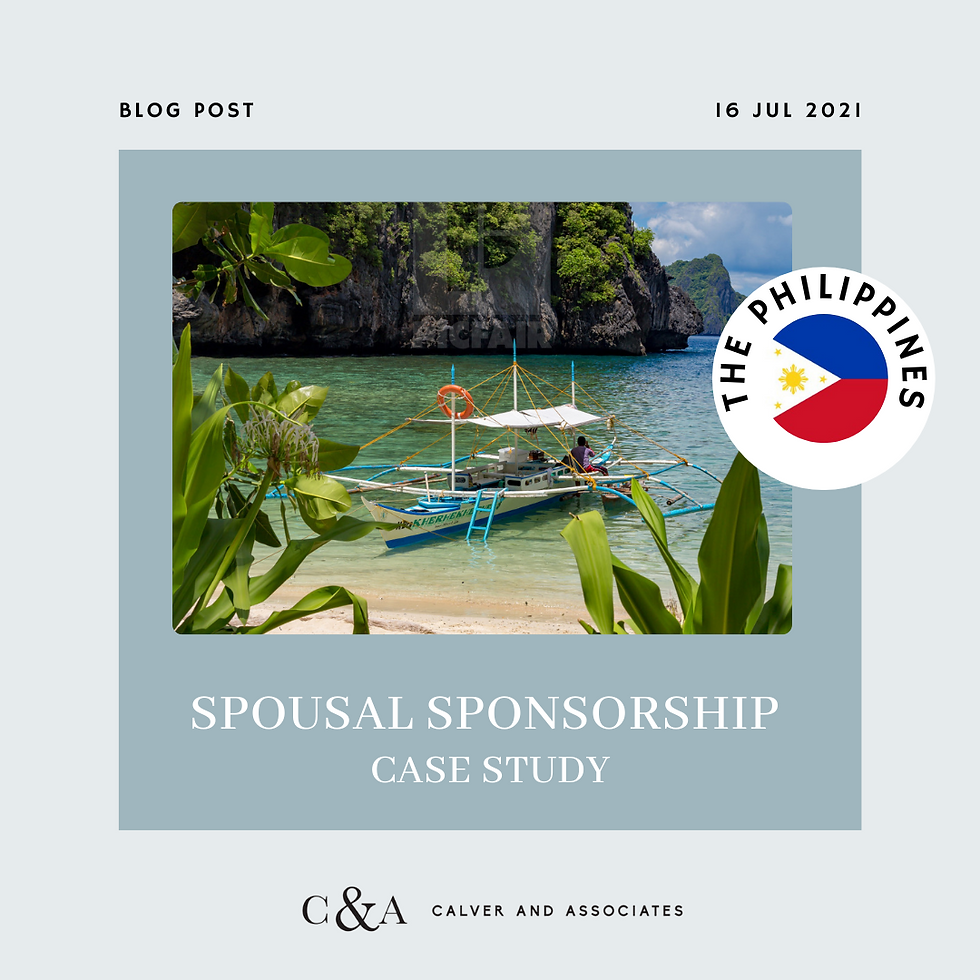Can I Sponsor My Brother or Sister to Canada?
- Calver Immigration Consulting Inc.

- Nov 14, 2019
- 3 min read
Updated: May 13, 2020
Generally, it is well-known that Canada has a Family Sponsorship Class of application that allows Canadian Citizens and Permanent Residents to sponsor their spouses/common-law partners, parents, grandparents, or dependent children to come to Canada.
However, we often receive inquiries from people wanting to sponsor other family members, such as their brother, sister, aunt, uncle, cousin, niece, nephew, or grandchild to come to Canada.
There are a few cases in which these family members can be sponsored: you may be eligible to sponsor your sibling, aunt/uncle, cousin, niece/nephew, or grandchild through the “Other Relative Program” (sometimes called the “Lonely Canadian Program”) or on Humanitarian and Compassionate Grounds.
Sponsoring a Family Member Through the “Other Relative” Program
You may be eligible to sponsor your relative through the “Other Relative” program if both you (the sponsor) and your family member (the principal applicant) meet specific requirements.
Who can be a sponsor
You can sponsor certain relatives if you are living in Canada as a Canadian Citizen or Permanent Resident over the age of 18. As a sponsor, you must meet certain income requirements and agree to provide financial support to your relative for up to 20 years after they become a Permanent Resident.
Who can you sponsor?
You can sponsor one relative whom you’re related to by blood or adoption if meet the requirements outlined by Immigration, Refugees, and Citizenship Canada:
You don’t have another living relative you could sponsor instead (i.e. spouse, common-law partner, conjugal partner, son/daughter, parent, grandparent, orphaned brother/sister, orphaned nephew/niece, or orphaned grandchild). You also cannot have a relative who is a Canadian Citizen or Permanent Resident.
You may see now why this category is often referred to as the “Lonely Canadian” category; essentially, the program is designed for those who do not have relatives in Canada and have no possibility to sponsor an immediate family member.
Sponsoring a Family Member on Humanitarian and Compassionate Grounds
To file a Humanitarian and Compassionate (H&C), you must argue that you or your family member(s) are in a situation of hardship or danger in which immigration to Canada is the only solution.
What is considered hardship?
Immigration, Refugees and Citizenship Canada considers hardship to be a lack of adequate healthcare; poverty; discrimination based on religion, gender, or race; laws, practices or customers that put an individual at risk of abuse or social stigma.
The H&C grounds case allows you to sponsor a relative to become a Canadian Permanent Resident when they would otherwise be ineligible for PR status.
A Humanitarian and Compassionate grounds case must have substantial proof to demonstrate the undue circumstances in which you and/or your family member is currently living. Some evidence you will have to provide includes letters, photographs, official documents, medical examinations, and more. The immigration officer reviewing your application package will assess these documents to determine the likelihood of extreme hardship if you or your family member stayed in their home country.
In sum, H&C applications are for those who do not have legal status in Canada and have no other options available to them. Some factors that may contribute to a successful application include if you:
Have family ties to Canadian citizens or Permanent Residents;
Are employed in Canada without a valid work permit;
Are studying in Canada without a valid study permit;
Are volunteering in Canada;
Are upgrading your English/French language skills;
Have investments in Canada in the form of property and savings; or
Have social ties within your community in Canada
Our Services
Calver and Associates is a leading provider of Canadian Immigration services in Durham Region. We serve clients in Oshawa, Whitby, Ajax, and beyond. Our Registered Canadian Immigration Consultant has over 10 years of experience in Canadian Immigration law and over four years of experience serving those in the Oshawa area.
We can provide assistance with applications for both temporary and permanent residency in Canada. We handle applications for study permits, permanent residency, family class sponsorship, visitor visas, work permits, and Canadian citizenship. We also handle criminal inadmissibility cases by developing remedies for refusal.





Need plumbing, heating, or cooling services in Vancouver?
A2B Plumbing & Heating offers 24/7 emergency repairs and expert installation of modern systems.
Call today and experience top-quality, professional service you can trust!
https://a2bplumbingheating.com/